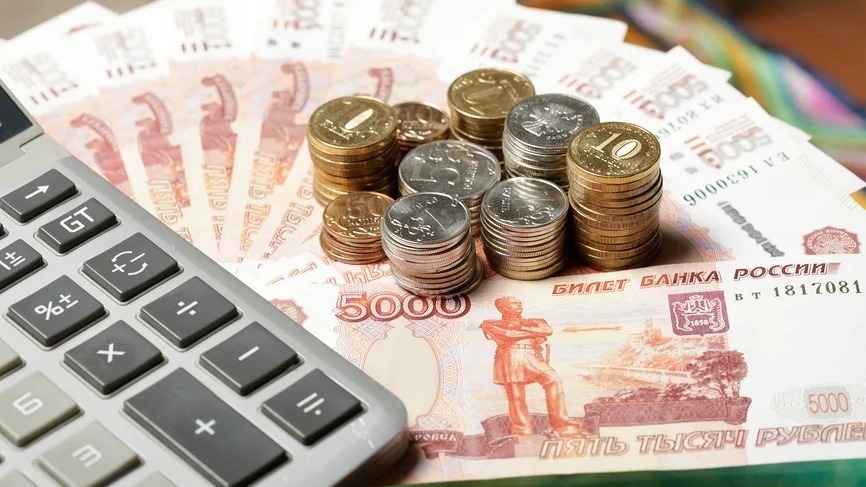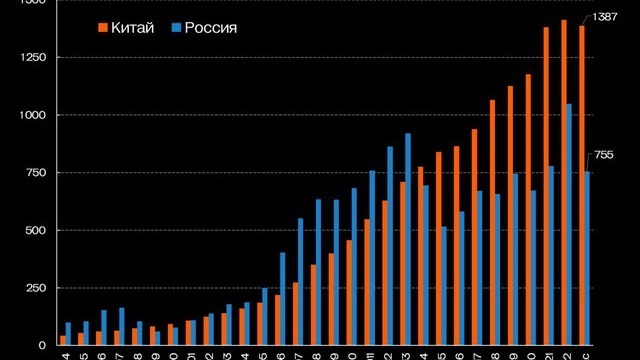Posted 12 сентября 2023, 10:15
Published 12 сентября 2023, 10:15
Modified 12 сентября 2023, 13:49
Updated 12 сентября 2023, 13:49

Figure of the day: the average salary of Russians was 2 times lower than that of the Chinese
IRINA MISHINA
At the current exchange rate, the average Chinese earns $1,387, and a Russian earns $755.
At the same time, back in the mid-2000s, the average salary in Russia was 2 times higher than in China.


Is the richest Russian poorer than the Chinese?
What else is interesting about statistics? It turns out that more than a third of Russians live on less than $ 10 a day, this follows from Rosstat data on the differentiation of the population by income level. Official statistics report on the approach of the average salary in Russia to the bar of 80 thousand rubles. At the same time, 37,7% of Russians receive up to 27 thousand rubles a month. 21,7% have an income below 19 thousand rubles per month.
When compared with average salaries in the US and Europe, it becomes even sadder. The average salary in the United States is about 36 thousand dollars a year, or about $ 3,000 a month (before taxes). From Europe, for example, you can take at least France, where the average salary is 2,500 euros before taxes.
Of course, there are million-plus cities in Russia and Moscow, where salaries are many times higher than the average in Russia. There are highly paid IT specialists, doctors and teachers. For example, according to the same Rosstat for 2022-2023, the average salary of Moscow residents was about 110 thousand rubles. Of these: doctors earned an average of 161 thousand rubles a month, IT specialists — 154 thousand rubles, in the financial sector the average salary was approaching 207 thousand rubles, in education — 102 thousand rubles, in production — 79 thousand rubles. All this is higher in comparison with the average salary in Russia, which today is 71,204 rubles.
For high salaries in Is there no military-industrial complex willing?
At the same time, there are areas that lure workers with ultra-high salaries. After the transition of Russian defense industry enterprises to work in 2 or 3 shifts, it turned out that there is often no one to work there. Defense companies from Moscow attract people with high salaries: for example, turners are offered up to 200 thousand rubles a month. But not everyone can afford it. For example, the management of the tank manufacturer Uralvagonzavod JSC complains that they cannot find people there even for positions that do not require qualifications. The problem is confirmed by the former Deputy Prime Minister and head of Roscosmos, Yuri Borisov, who predicts a shortage of 400 thousand people for defense industry enterprises in the future, including 120 thousand people with higher education. And this is despite the salaries. But there is no shortage of workers in the construction complex. And the average salary of a builder in June of this year was 67.8 thousand rubles there. Although we all understand that when paying guest workers, «gray schemes» are most often used, and the real salary is much lower even than this.
So what is the reason for the difference in salaries between Russians and Chinese? We have wealthy financiers, IT specialists and doctors, but at the same time the streets are filled with Chinese cars, which are becoming more and more. And planes from China to the Russian Federation are packed with luggage with «gray imports», and not vice versa. And a Russian employee has been receiving less than a Chinese one for almost 10 years in a row…
«Our economy is now focused mainly on raw materials and the military-industrial complex. And this will not give rise to high-tech production, which traditionally has the highest average salaries. From the point of view of modern technologies, the military—industrial complex is a rather primitive production, therefore, high salaries there are a one—time action of the current moment. And even for these high salaries, there were no qualified workers, and there are none. If we compare it with efficient economies, for example, in Germany, Holland, China — there is peaceful production, but it is high-tech, there are hardware fitters working on software-controlled machines, and this is practically an engineer. We have mostly migrant workers without education with a gray salary,» says economist Dmitry Potapenko.
Hello, we are looking for innovations!
According to statistics, China, which is constantly criticized for the focus of the economy on production, and not on the incomes of citizens, incomes are constantly growing. Is it not worth studying the Chinese Policy of Universal Prosperity more closely in this regard? Many «Chinese recipes» could help Russia, for example:
- The fight against monopolies, the redirection of capital from monopolies to innovations.
- Promotion of mass joint-stock ownership.
- Motivation of the company to invest in shares of innovative companies.
We should not forget that in the modern world, any economy is embedded in global processes, and only this will make it possible to be unprofitable.
«In Russia today, the economy has a narrow market. And the economy of the same China is embedded in the world — just like the economy of, for example, Germany and France. As a result, in terms of GDP, China is on the 2nd place in the world, we are on the 11th. And we will not rise higher until we establish integration with the world,» says economist Dmitry Potapenko.
Economist Andrey Vernikov agrees with him:
«Our economy is not developing in fact. Only oil workers live well. And there can be no high salaries in a commodity economy. When we start producing iPhones ourselves, then average salaries will grow. We started talking about moving away from the raw materials economy 20 years ago, but nothing has been done during this time. We have created the Skolkovo Innovation Center. And where are they, innovations? I see the way out precisely in innovation, protection of property rights and co-financing of innovative programs aimed at creating high technologies.»